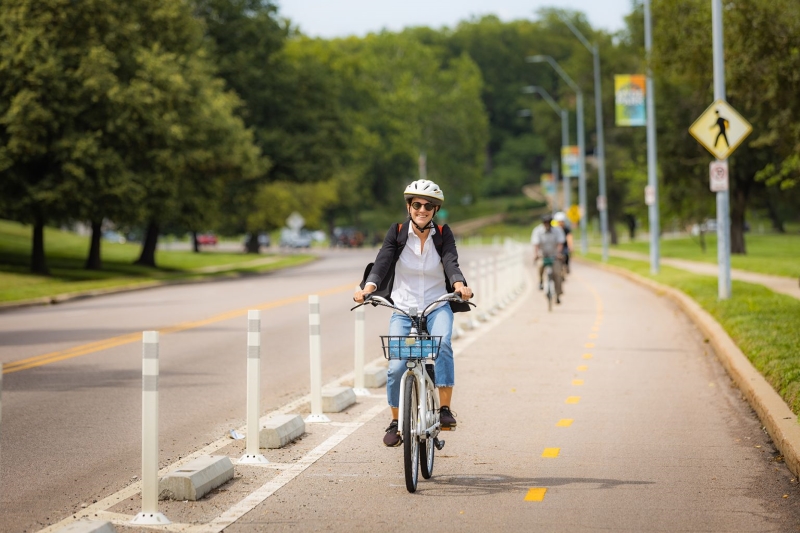Challenge yourself and your community to bike, walk, carpool, vanpool, scooter, or ride transit to work this fall for Kansas City’s Green Commute Challenge, October 1 – 31.
The free, annual challenge encourages individuals and workplaces to find alternatives to driving for daily work commutes.
Throughout the month of October, participants record green commute trips to earn points and get entered in weekly drawings for prizes from local businesses and makers. At the end of the challenge, prizes are awarded for categories like ‘most green trips completed’ on both the individual and team levels. This year’s grand prize is an e-bike.
The Green Commute Challenge is in its 16th year. It is hosted by WAY TO GO, formerly known as RideShareKC, a program of the Mid-America Regional Council (MARC).
By participating, not only will you save money, but you will also play a role in improving local air quality and become part of a larger community of people interested in sustainable transportation in the region.
Greener commutes can have many positive impacts on the region, including:
- Reduced harmful emissions — During the warmer months of the year, from March 1 through October 31, the Kansas City region is more likely to experience ozone pollution, which occurs when emissions from cars, trucks and other sources interact with heat and sunlight. Ozone pollution is harmful for everyone to breathe, especially children and people with respiratory problems, such as asthma or emphysema.
- Health benefits — In addition to contributing to better air quality, commuters who use sustainable transportation can gain health benefits from reduced stress and increased physical activity. Commuters can also save money on gas and vehicle expenses.
- Lessen impacts of climate change — As outlined in the Kansas City Regional Climate Action Plan, reductions in the amount of travel and the use of fuel sources that produce fewer greenhouse gas emissions are ways to reduce the impact of the transportation sector on climate change.
“Being a green commuter doesn’t have to be an all-or-nothing endeavor,” Rachel Krause, WAY TO GO program coordinator said. “You can start with one or two days of carpooling, biking or riding transit to work. Can you walk or ride a scooter to a meeting instead of driving? If childcare or school drop-off is a regular part of your day, try parking your car near your children’s school or daycare and bike or ride the bus to work from there. Even small changes can have a big impact on your individual wellbeing and our regional air quality and traffic.”
How to Join the Green Commute Challenge
The Green Commute Challenge will take place on the WAY TO GO website and app. You can sign up and join your workplace, your neighbors, or a community team. Then, log your trips and win prizes.
To get started, visit waytogokc.org.
Photo courtesy of WAY TO GO
